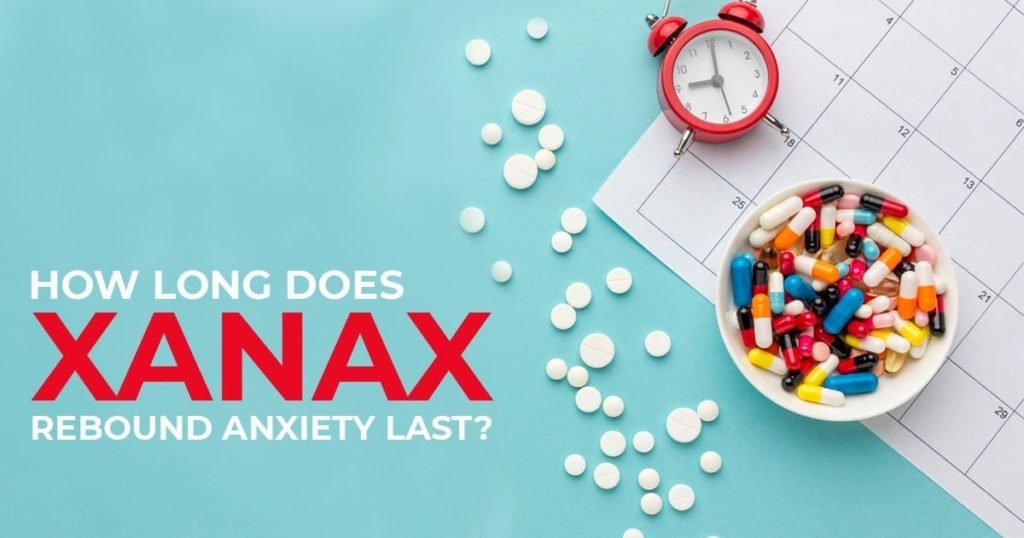If you’ve ever wondered, “how long does Xanax rebound anxiety last?” You may have a legitimate prescription for the drug. You might also use it recreationally, leading to physical dependence and a substance use disorder. Regardless, below, we go into what you need to know about taking it, the side effects, and more on how to deal with rebound anxiety.
What is Xanax?
Xanax is a prescription, brand-name drug. The generic name is alprazolam. This medicine is part of a class of medications called benzodiazepines and is the most prescribed psychiatric drug in the United States. Benzodiazepines, or “Benzos”, are used to help treat anxiety, panic disorder, and insomnia. Benzos slow imbalanced brain chemicals and increase the effects of gamma-aminobutyric acid, a calming neurotransmitter.
Other drugs that are benzodiazepines include: diazepam, clonazepam, and lorazepam. These anti-anxiety medications are available only with a prescription and are controlled substances. A controlled substance is one with the potential for abuse or dependence.
There are quite a few potential common side effects of Xanax, including:
- Allergic reactions
- Changes to sex drive
- Alterations in appetite
- Confusion
- Forgetfulness
- Problems sleeping
- Depression
- Drowsiness
- Feeling lightheaded or faint
- Problems speaking or slurred speech
- Changes in mood
- Feeling tired or weak
The drug has a sedating effect, so you’re likely to feel drowsy and less alert when you use it. If you mix it with other sedatives such as prescription opioids or alcohol, it can slow the functions of your central nervous system to a dangerous, potentially life-threatening, level. An overdose involving benzodiazepines can cause you to stop breathing and can ultimately lead to death.
Before taking Xanax, you should tell your health care provider about any other medications or supplements you use, including anything available over the counter.
Benzodiazepine Dependence
While it is a prescription medication with benefits for some people, benzodiazepines, including Xanax, have abuse potential. This potential for misuse is why they’re federally controlled substances.
The use of Xanax is supposed to be short-term. It’s not meant as a long-term anxiety treatment because the longer you use it, the more likely addiction and dependence are.
Some people use Xanax for a relaxed high it can create, especially at higher doses, when combined with alcohol or other substances, or when you take it without a prescription. There are millions of visits to the emergency room each year in the U.S. because of the nonmedical use of prescription drugs, including Xanax.
Signs of Xanax addiction or abuse can include:
- Continuing to use the drug despite known adverse consequences
- Not being able to stop using it, even when you want to
- A loss of interest in things you once enjoyed
- Obsessing about getting and using Xanax or other benzodiazepines
- Loss of control over your use
- Legal, financial or relationship problems related to use
- Risky behaviors when under the influence
When you’re dependent on benzodiazepines and try to stop taking them suddenly or cold turkey after long-term use, you may have severe withdrawal symptoms. If you’re a long-time or heavy user of Xanax, it might be painful when you experience the rebound.
Before the discontinuation of treatment or use, you should talk to a health care professional. You may need to lower your dose rather than abrupt cessation gradually. If you reduce your Xanax dosage progressively, then it reduces benzodiazepine withdrawal syndrome.
Xanax Withdrawal
Possible withdrawal side effects include:
- Feeling lightheaded
- Muscle aches
- Changes in blood pressure
- Insomnia
- Fatigue
- Involuntary movements
- Nausea and vomiting
- Diarrhea
- Sweating
- Weight loss
- Reduced appetite
- Muscle spasms
- Irritability
- Blurry vision
- Impaired coordination
- Muscle twitches
- Tachycardia and heart palpitations
- Problems with memory
- Confusion
- Depression
- Mood swings
Rebound Symptoms
There are rebound symptoms that can occur when you try to stop taking Xanax. A rebound reaction includes worse symptoms of a pre-existing mental health disorder. These symptoms are often what you initially took the Xanax to help with, such as anxiety, insomnia, and panic attacks. Since symptoms are potentially severe, medical detoxing from Xanax at an addiction treatment facility is recommended.
How Long Does Xanax Rebound Anxiety Last?
Xanax is a short-acting benzodiazepine, according to the Mental Health Services Administration. That means it’s faster-acting than many other types of longer-acting benzodiazepine drugs. Withdrawal tends to occur relatively quickly as a result. You may notice withdrawal symptoms occur within an hour of your last dose. These symptoms usually last for around a week.
Factors that impact how long withdrawal symptoms last include:
- The length of time you were using benzos
- The dose you typically took
- How often you used benzodiazepines
- If you took Xanax with other substances or alcohol
- Your medical and mental health history
The thing with rebound symptoms is that they can last longer than some of the more acute withdrawal symptoms. If you don’t receive treatment for the rebound anxiety or other symptoms of post-acute withdrawal syndrome, you might notice symptoms for months or more.
Symptoms can include rapid breathing, increased heart rate, and trouble concentrating. You may have a hard time falling asleep and feel restlessness or like something bad is about the happen all the time.
It’s normal to feel a sense of anxiety or stress in certain situations. If you have an anxiety disorder, you likely feel it all the time. These feelings can be debilitating. If you have severe anxiety, your functioning in your day-to-day life may be affected.
You have to receive treatment for pre-existing psychological disorders.
How to Deal with Rebound Anxiety
If you take Xanax regularly, there are a few things to note about rebound anxiety and how to deal with it.
- First, you should talk to a health care professional before you try to stop using any benzodiazepine, mainly if you’ve been on it for an extended period. A mental health professional can create a tapering schedule customized to your needs to minimize the withdrawal period. For example, they might reduce your dosage by around 0.5 mg every few weeks. A tapering schedule needs to be medically supervised and carefully followed because benzodiazepine drug withdrawal symptoms can be severe.
- When it comes specifically to how to deal with rebound anxiety, the underlying issue needs to be treated by a mental health professional.
- What can happen if you take Xanax is that it masks your symptoms of an anxiety disorder. Even though benzodiazepines are short-term anxiety treatments, that’s not always the case. Then, rather than working on a treatment plan for your anxiety that includes longer-term medicines like SSRIs along with talk therapy, you’re using the benzo as a crutch.
- The best way to get through rebound anxiety once you’ve followed a tapering schedule for Xanax is to talk to a mental health professional. Until you receive treatment for the underlying conditions, you’re likely going to continue to experience symptoms, and they may get worse.
SSRIs are frequently helpful for the treatment of anxiety. These drugs are antidepressants that affect neurotransmitters, but they don’t have an addiction or abuse potential. SSRIs do usually take four to six weeks to start showing effects.
Beta-blockers are another type of medicine for anxiety. They are most often used in the treatment of heart conditions but have off-label uses for the physical symptoms of anxiety and the treatment of panic disorder.
When paired with talk therapy and perhaps lifestyle changes, you can learn how to deal with anxiety and other potential rebound effects common with benzodiazepine addictions and dependence. If you’d like to learn more about the available treatment options, like support groups, please call (858) 258-9883 and talk to the team at The Mental Health Center of San Diego today.















